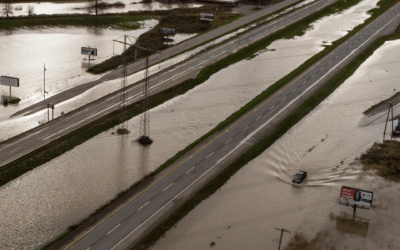(Originally published in Le Devoir on September 29, 2022. The original has been updated to reflect the results of the October 3 election.)
The 2022 Quebec election was launched against a backdrop of soaring inflation. All parties proposed policies to address the concerns of families struggling to make ends meet, but, some of the best solutions will come from what may seem like a surprising direction: climate policies.
To reduce the cost of living for families, now and in the coming decades, Quebec can act on two fronts: accelerate electrification to significantly reduce families’ energy bills, and considerably increase adaptation efforts to reduce the accelerating costs of climate damage.
Electrify (almost) everything
Much of the energy we use comes from highly volatile fossil fuels, and their costs are often influenced by events beyond our control, such as Russia’s invasion of Ukraine. To reduce our dependence on volatile fossil fuels, we need to make a significant and rapid energy transition. This means producing more electricity from wind and solar, and using that clean electricity to power our transportation and heating rather than fossil fuels.
While Quebec enjoys clean electricity production thanks to its abundant hydro, over 54 per cent of the province’s total energy consumption still comes from oil and fossil gas. Massive electrification of transportation and heating, as electric vehicles and highly efficient heat pumps become more widely available, would lower total household energy bills as electricity is much more efficient and affordable than fossil fuels. Ultimately, more than half of the province’s climate pollution would be eliminated.
Consider the Inflation Reduction Act in the United States. Resources for the Future, an independent non-profit research group based in Washington D.C., projected electricity rates for a series of scenarios under the act, taking into account the variability of future fossil fuel prices, investment and technology costs, and the passage of specific provisions in the legislation. They determined that by switching to clean electricity, the average American family could reduce their electricity costs by $175 to $220 per year and also be protected from the volatility of natural gas prices.
In Quebec and Canada, although the investments required to increase generation and transmission capacity may increase electricity rates, our analyses show that the share of household spending on energy consumption, from all sources, will decrease significantly.
Adapt or…pay more, much more
Unfortunately, it’s already too late to entirely avoid the warming that scientists have been warning us about. In Quebec, accelerating climate change is costing households dearly, and the costs will only increase, hitting families in many different ways.
There is the direct cost of damage from extreme events to homes and other property, and the added cost of rising insurance premiums. Even if households are insured, they’ll still be stuck paying some of the bill.
As the latest report from the Canadian Climate Institute shows, as climate change and its impacts on the Quebec economy intensify, some of the indirect costs are less apparent to households. Economic slowdowns, tax increases to pay for climate-related disasters, job losses, and increased costs of goods due to disrupted supply chains will have a very real impact on households.
The question is no longer can we afford to act on climate change? We simply can’t afford not to.
The cost-of-living crisis was on the ballot this election, but the role of fossil fuel volatility and climate damages in driving that crisis are not well enough understood, nor are the ways that good climate policy can protect Quebecers from further cost increases. Switching from volatile fossil fuels to increasingly affordable clean electricity, while increasing the resilience of our systems to avoid endless repairs, can have a real impact on the bills and well-being of Quebecers for many elections to come.







